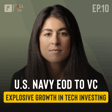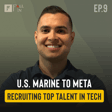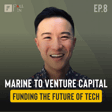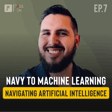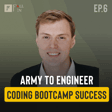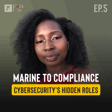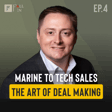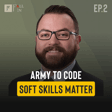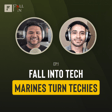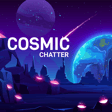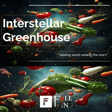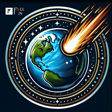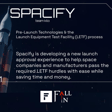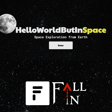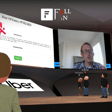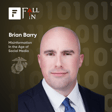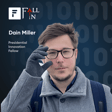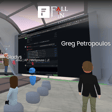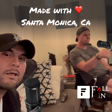Become a Creator today!Start creating today - Share your story with the world!
Start for free
00:00:00
00:00:01

Fall In: Vets Hackathon Winners Gallop Towards Wellness
Dive into the minds of the champions from the recent Mental Health Vets Hackathon. In this episode of "Fall In Vets Hackathon Podcast," we converse with winners Michael Sigg and Gladys Chiang. Uncover their innovative solutions, the role of tech in veterans' mental health, and the transformative power of collaborative action. Join us as we celebrate innovation, resilience, and the future of tech in veteran mental health. #fallin #veterans #mentalhealth #VetsTech #MentalHealthHackathon
Link to project repo: https://github.com/istoga/Team-Alpha-Vets-Hackathon
Winners site:
https://www.fallin.today/winners
Transcript
Introduction and Hackathon Winners
00:00:01
Speaker
All right, welcome to the Fallen Vets Hackathon podcast. I'm Jamil. And we're here with Michael and Gladys. So yeah, these two are the winners from our previous Hackathon for Team Alpha. And yeah, thanks for joining. So yeah, I'll start with Gladys.
Gladys' Journey and Passion for Mental Health
00:00:25
Speaker
Can you tell me a little bit about your background and what led you to the Hackathon?
00:00:29
Speaker
Yeah, definitely. So first of all, thank you for having us here. And yeah, my journey began when my family immigrated to the United States when I was just 11 years old. And back then, my English was very limited to like basic phrases like
00:00:48
Speaker
Hi, how are you? Like, pepperoni please, really to just get by. But yeah, I had the essentials down, but the real challenge began when I stepped into the American classroom.
00:01:03
Speaker
And just as you would imagine, right, classes are hard for me or someone who's still trying to learn the language and learning a new language while trying to keep up with academics was a daunting task. And I even failed my seventh grade biology class.
00:01:21
Speaker
If my biology teacher and my classmates from that time could see me now with a bachelor degree in molecular science developmental biology, they would probably be shocked. They would be like, what? Yeah, it was not easy to assimilate into a completely different culture, language, and environment given the little social capital we have as immigrants. And this often translates into like a lack of resources, support, and
00:01:50
Speaker
loss of direction, which could take a toll on one's mental health. And like many in my community, socioeconomic factors have restricted our access to mental health resources and culturally sensitive health care
00:02:05
Speaker
And that's where my passion for mental health came from, like my very own backyard and community. So I joined a nonprofit clinic, AHS, as a mental health counselor in Oakland, because I wanted to provide
00:02:20
Speaker
equitable access and a safe space for people while advocating for the success of youth, really sparing these kids and youth from the challenges I had to go through. And aside from the one-on-one counseling I conducted as a counselor, I also host like co-facilitated community workshops to break stigma against mental health. And these workshops really advocated for improved mental health practices addressing various aspects that can affect one's mental well-being.
00:02:50
Speaker
and viewpoints on them while considering cultural, social, and environmental context. But I knew I wanted to do more, so I wanted to make an even bigger impact. And that's when I turned to innovation in the tech field, which ultimately led me to participate in this hackathon. And I saw app development as a means to create a solution with the potential to benefit
00:03:15
Speaker
people nationwide. And it's just my way of giving back and using my own journey of overcoming challenges as an immigrant, as a fuel to drive positive change. And in this community and this country that nurtured me into the person I am today. That's awesome. Yeah, from pepperoni please to hackathon. That's a great story. What a great story. Yeah, definitely a natural.
Michael's Transition from Military to Tech
00:03:44
Speaker
Michael would love to hear your background as well. I don't know if I can follow that. That was too good. Hi, my name is Michael Sig, former Army veteran 2002 to 2007. I guess the quickest background I can give, I grew up in LA, which is slower Alabama.
00:04:04
Speaker
I joined the military right after, I joined the army right after high school. I lived right outside of Fort Rucker, Alabama, which my parents also served. So it really influenced, I guess, my decisions because I didn't want to go to college at that time. And fast forward even further, after my service, I went to defense contracting for a little bit and had a little bit of identity crisis, like probably millions of other events. And just
00:04:34
Speaker
About three years ago, I got laid off and I just wanted to think about where I was going next because I felt like the clock is winding down and I wanted to think about tech and I love tech. And when I say tech, I mean, just generally speaking, I like to build computers, play video games. And I kept saying, I, I'm looking for a career here because I like, I think, uh, coming out like many other vets.
00:05:01
Speaker
It's really hard to find direction to, and when you're looking for camaraderie community. And, uh, while I was yearning for that, I also had to realize that, you know, the name of the game really felt like to succeed here. I needed to push myself instead of just trying to get a cubicle job, like where I was at as a cat operator before. And, um, I really appreciate that experience, but I went to a coding bootcamp code up in San Antonio.
00:05:29
Speaker
was okay, but really what accelerated where I am today, which I just finished an apprenticeship at Accenture here as a software developer associate. I want to definitely highlight that part associate is when I met my mentor.
00:05:48
Speaker
Matthew Shaw from Google at Google VetNet. And that moment meeting him and him really taking me and giving me the one-on-one because he knew what it was like for coming out of what I did not know, thinking about concepts like pickle notation and just algorithms and just thinking about that or writing about data structures or conceiving those ideas of how to manipulate data.
00:06:14
Speaker
That wasn't in my wheelhouse until I started taking technical interviews and I was just blown away. So now I am also a fellow at formation.dev. And that has really given me a lot more confidence trying to enter the industry, which is extremely tough. And I hope we can get into that today a little bit. But that's me in a nutshell. And I live in Austin, Texas. I should have said that from the beginning.
00:06:40
Speaker
Awesome. Yeah. I love the barbecue there in Austin. I have some Marine Corps friends there.
Conceiving the Equine Therapy App
00:06:46
Speaker
Yeah. So I'm curious, you guys signed up for the hackathon and you guys get, you know, into these teams and, you know, what sparked the idea for equine therapy, the horse therapy app that your project or your team has built. Yeah.
00:07:07
Speaker
Yeah, so actually, I joined the team a little bit late. So when I joined, I had some ideas about what I want to do for the mental health to help veterans. But at the time I joined, they had already consolidated the idea for equine therapy. But what I love so much about it is that I didn't know what horse therapy is.
00:07:35
Speaker
And I got to do some research myself, and then I grew to love this idea and I love how we can streamline the whole process, helping connecting veterans with the right services near their geographic area, and then connecting funding resources for third-party providers. I know it's just so cool to me that
00:07:58
Speaker
It really is just so amazing that it really is developed come from like veterans point of view because I think I'm the only civilian here on the team and I get to hear about their perspective. I read the notes they wrote from each team meeting. I get to see from their point of view and how like it's really created by veterans and for veterans with their unique perspective and what they need and that's what I love about it.
Overcoming Hackathon Challenges
00:08:27
Speaker
Awesome, Michael, did you were you kind of wrestling with different ideas as well? I remember Greg was saying that you guys were considering like a pill counter idea or or some other ideas. Yeah, curious to hear from your perspective on on how you guys landed on on the horse therapy app.
00:08:46
Speaker
Yeah. Prior to Gladys joining, I do remember us ruminating on a lot of ideas. And I think where it started to manifest was Greg initially had said, let's look at what the VA app actually has, the platform itself, and let's not try to do something that's already in place. And I think Greg was the originator of the idea, and he just kind of threw out equine therapy and
00:09:14
Speaker
I don't think anybody had anything that was sticking at that point. And I thought it was very, very novel. And it drew me, the idea was drawn to me because it was like, like Gladys had said, I had never, I never thought about equine therapy. I derived some ideas from equine itself, hearing the word, but
00:09:32
Speaker
I don't think this is a well explored area. And I do think people, I'd say like, I'm born, I'm 1984. And I think people in our age group are looking for alternative means of any kind of engagement coming off of COVID.
00:09:49
Speaker
I was like, okay, this seems a lot more intriguing and novel than just making another to-do app or something to integrate into another app. And really when I started digging into it, I found it very interesting that the VA was promoting it, but they themselves just didn't have a network really meant for that. So it felt more like there was an initiative elsewhere than the VA coming in, like maybe some
00:10:17
Speaker
Ranch owners or something like that probably approached them and thought this could be a viable option But yeah, I guess we could go into that later. But yeah, that's kind of how it came about cool So you guys you know come up with the idea starting to formalize a bit Talk to me about some of the challenges that you guys are running into and your approach to solving them I know there's so many different kinds from
00:10:43
Speaker
from designing to the actual, you know, implementing the development to kind of polishing the read me's and like the project, you know, sort of descriptions and all that sort of stuff. But yeah, Gladys, you want to take that one?
00:11:01
Speaker
Yeah, to preface it, this is my first hackathon. Like I mentioned in my journey, right? I went from like mental health counseling to want to do more. I dive into research, but then now like being the tech world, developing an app is new to me. And to get my feet wet, really, like Greg knew this is like my first experience. And he asked me from my experience and I say,
00:11:27
Speaker
really like I try I'm the type of person who like I want to do something I just go for it right I go for it but I try to prepare myself and at that time I was taking classes from the free coding website and I just try to learn as I go and Greg knew about it and he was he as the lead as the leader of the team Alpha
00:11:52
Speaker
he really tried to make sure that I feel useful and that I get to optimize whatever I know. So what I know best is some coding. I want to practice more too, and that's why I joined here. And another skill of mine is designing. But this is my first time in this team setting where I want to communicate with everyone, but then I felt like
00:12:20
Speaker
Oh my God, like everyone's so cool. I feel like I was the only one here with little experience. So at first it was intimidating for me, but then everyone was so welcoming. I remember like when I show the design, people will engage in discussion. And when I have problem coding, I encounter so many problems when it comes to using GitHub as a first-time user. And they are also helpful.
00:12:49
Speaker
I'll reach out to Greg. I'll reach out to like, you know, Michael, I remember like maybe a few days before our hackathon, right? We're all like staying up until like super, super late and we're just talking like, Hey, like how do I solve this problem? So really like our, what I appreciate a lot about this team is the way we communicate, the way we help each other out.
00:13:14
Speaker
And, you know, people making each other feel welcoming and comfortable even as the beginner here. Yeah. Very cool.
Team Dynamics and Motivation
00:13:25
Speaker
Yeah, Michael, do you want to go next? Yeah, and Gladys, I have to say I, I'd never felt that way like you just felt like you were so put together on especially on the business side when you were making the ideas of how to form it. I was like, man, like,
00:13:40
Speaker
This sounds like a lot more direction than what we have right now. You know what you're talking about clearly when you're making, especially when you're talking about a high level of outlining, maybe perhaps what it could be. And yeah, I would definitely say more talking about obstacles. I mean, I can't pinpoint every single one, but I can definitely say that when it came to design choices, Greg was pretty much the architect of everything.
00:14:11
Speaker
And we kind of just kind of piggybacked off of his experience because I think Daryl and I, we didn't, I did not have, I'm gonna speak for myself, I didn't have the experience that Greg had. And he did a fantastic job of just like putting things together and having a clear idea because it was his idea on top of that. And then so when it came to implementing and starting to draw it out, I felt like,
00:14:39
Speaker
The thing that I felt maybe because I have so little experience in the industry and I get gauged at stuff like runtimes and thinking about optimization, this was a hurdle I couldn't get past because just to get a little bit into detail, I guess like I would always see, let's say for example, how we were getting the VA location websites themselves.
00:15:02
Speaker
We were hitting the endpoint, I think it's called API locations facilities or something like that. And when we were looking for any website, any regional location that could have that, we actually, instead of grabbing it and parsing it,
00:15:19
Speaker
on a call, we just scraped it one time and then put it into a humongous array of 200. Really, what would have been much more effective is just actually thinking about, let's just say, since the website, the URL itself had a fixed link at the end and in the beginning, we could have gotten something like Houston because the VA's website was very interesting because it has stuff like
00:15:47
Speaker
Michael DeBakey, I didn't say Michael DeBakey.com, I said Houston.com, but there was stuff like North Texas. And then what falls into North Texas? Is that Amarillo? Is that Austin? Is that Lubbock? I don't know, right? So we could have had a much better way of, and this is what I should have could have, but it was designed to us like that.
00:16:10
Speaker
I don't want to say butt heads, but I felt very passionate about because this was my first time. And if eyeballs were going to ever come onto this thing, I had something to prove in that sense that I wish we could have went into because
00:16:25
Speaker
I really enjoy doing the project overall. I'm very passionate about connecting with veterans. And like Gladys has said something about utility earlier, I really care about at least being something tangible for people. You know what I mean? Like it doesn't have to be a standalone app that maybe it could morph into something.
00:16:45
Speaker
The obstacles were always about purpose, I think. Generally, it was always about purpose. How are we going to do it? Because the idea was clear of what it was going to address in terms of how we're going to... What the subject was, equi-therapy, but implementing the details of what our site was going to do.
00:17:08
Speaker
having so many people and had so many ideas with varying ideas that two days just felt so daunting to distill down fast. Yeah. Yeah. So in these moments of conflicts and just challenges, what kept you guys pushing through?
00:17:29
Speaker
You're running into something totally foreign with Git or something totally foreign with designing on Figma. What made you guys stick it through and be like, I'm not going to log off. I'm going to continue to show up and put in effort.
00:17:49
Speaker
Yeah, yeah, definitely. Just like what Michael said, we're here because we want to make a difference, especially using our unique perspective, our skill sets that we know of and turn empathy into tangible solution. So with that passion alone, like we're not going to give up just because there's a little setback. We're going to try our best and overcome that and that the resilience that
00:18:15
Speaker
everybody especially like people who try and like put themselves out there and like you know like expand their comfort zone horizon like we all have that and i really appreciate that yeah what about you michael yeah given moment i guess i never thought about that because i'm just too bullheaded that i don't think like that i mean i thought more about failure than giving up of how bad i was going to fail in terms of what kept me going is that
00:18:45
Speaker
I guess I knew why I came here. I really cherish time with vets. And just to give something little personal, there's like, I didn't really have this sense of, I had grown up in the military community so often that I never really thought about my coming out that I just remember coming out as an Evor. And just to say also, I think all of us were enlisted. So I think that helped a lot. I didn't feel like someone was like, hey, I'm part of the NCO club here, pal, you know, go ahead and take a seat.
00:19:16
Speaker
Greg was really good about that. And Darryl, I'm guessing too, probably was, I'm not sure what his name was, but the vibe never felt like someone was above another person. So that really helped out. And so we didn't have any of these moments of friction over like, this is my project, this is yours. And Nika also, she was great to work with, very easy. So there was no give up moment, but what kept me going was definitely like, if,
00:19:42
Speaker
When I think about utility and I think about vets, I very much care about this community a lot because I guess I've just come to a point where I cherish my
00:19:55
Speaker
my time in service, I wish I would have done a lot better if I were being honest, but I really think about all the people that had come before me. If there's some way I can try to find a way to make a bridge in any way, if that's it through the app or explain the app or helping somebody make their own app, but that's what was on my mind. I'm thinking like, all right, if this is a chance that we're around other vets doing something that we care about and
00:20:24
Speaker
It just, I don't know.
Memorable Hackathon Moments
00:20:25
Speaker
I don't think about quitting. I'm thinking about how can we optimize this? How can we truly make something here rather than just, you know, making some novel idea that we're going to throw at Y Combinator, which will never happen. This is my opinion.
00:20:40
Speaker
Cool. So as you guys are working through this, can you share some memorable team moments that occurred during the hackathon, whether it was with the VR space or whether, you know, something late night, any stories come to mind? Little moments here and there. I like the late night chat where like I remember like we're trying to finish our app and I encounter problems. So we hop into this, like,
00:21:10
Speaker
political so I can ask questions people ask questions and we can all figure things out together and I remember one night like Michael and I were I was just like Michael how are you doing right now? I really like we're just like they're giving each other like support and I really cherish that moment cuz like to be honest I was nervous right this is my first hackathon and like just
00:21:35
Speaker
hearing this like support and feedback from like Hanika, Daryl, Michael, Greg, they're all amazing and like supportive. And the day of, I remember I was like, wow. Like the full in like the whole like space there, it was so cool. Like I didn't know
00:21:53
Speaker
this is my first honey in the virtual space where you can present your project your team effort together and then seeing how everybody come together and oh my god we have live dj there like who thought of that like that's pretty cool so overall it has been a really like
00:22:12
Speaker
Surprising, yeah, like really like positive experience for me. And I definitely recommend everyone like all level, like even if you're a beginner like me who just want to, you know, try it out, see, and then like do something tangible. Like definitely this is the experience. Awesome. Yeah. I definitely remember that Gladys and I remember the first time meeting you on that call. And yeah, I,
00:22:40
Speaker
I just, I could empathize with you so deeply or sympathize rather, because you were talking about how nervous you were and this is your first time. So I definitely remember that a lot because when you share your experiences and you know, your imposter syndrome, like that's so prevalent that
00:22:57
Speaker
I don't know, it was just kind of surreal that I could try to interact with someone else on the other end because I thought it was only me. It's usually one way. It's like, it's me having it and someone else is consulting me, right? So it felt, I really appreciate that moment because it felt like I could connect at that level of where you were coming from Gladys. But another moment I could definitely share was definitely, I think it was like we were halfway in, as in day, day and a half, I'm not quite sure. But there was a point where Greg,
00:23:26
Speaker
and Daryl were really going into thinking about the site layout. And I believe Gladys had already made kind of on Figma what this was going to come out to look like. And just like I alluded to earlier, I was thinking about, OK, well, how would we implement the actual features in code, right? And I would definitely say there was quite a bit of friction, at least from my end, and not intentionally in that way. Because it started off very, very not.
00:23:56
Speaker
You know, Oh, that's nice. That's a great idea. And we started getting into a little bit of, uh, let's say server calls and using methods on strings and arrays. And I was really helping on that. And I was like, Hey, we're already, let's say already into a loop and we're already going, we're already nested in so many times. Why do we call these instances? And maybe that's just how junior I was because this was an MVP, but.
00:24:24
Speaker
I really, what I appreciate about that moment is that that was my first time actually being in a production setting where people cared enough that they were willing to hear that idea. You know what I mean? Because typically I'm doing a side project on my own or maybe I do something with my bootcamp and we're just trying to get across the finish line here. You know what I mean? Tomorrow it's over. And here I could definitely tell everybody was really in it to win it.
00:24:52
Speaker
that moment right there really made me feel like this must be what it's like to be in a production team like at a smaller scale but where people have butting heads and get along and try to integrate as much as they can with each other. The outcome of that was they listened to my idea and I think we ended up putting into, let's just say again using that
00:25:14
Speaker
Because Adriana had made a big point about that when she gave us the critique about the website. We had literally 2,000 on that list. And we just threw it into a set just to take all the unique IDs. And I was just like, hey, the server has memory, so we can't just be putting stuff like that up there. But it was really, I really appreciate that moment because I had never experienced anything like that yet at that point.
00:25:42
Speaker
Very cool. So you guys obviously bring such diverse backgrounds into this team. What would you say?
Individual Strengths in Teamwork
00:25:51
Speaker
What strengths did you guys bring in and how did you guys play into those strengths? Yeah, so I feel like for me, my strengths definitely coming from the academic side of me where I love doing research and I said just the user data.
00:26:09
Speaker
So I create a survey we try to survey some veterans before To like get an idea like what what are you looking for in this app and like how can this
00:26:21
Speaker
useful for you and like what can we do? I want to hear from their perspective because again I truly believe like these are the things we try to do. We're trying to connect and meet unmet needs and then try to create a solution that's useful. It's not just an app, it's a solution right? And that's why the user data came from
00:26:41
Speaker
And then also another side of me is that I love designing and I just immediately I look at the app outside. I want to design. I want to design the loading screen on this on the footer like logo. And I just I can't believe that like one day I can use my my love for art for design and use it in a way where people can like connect quick and use that app for something for a greater impact and
00:27:11
Speaker
Love it. Yeah. It's amazing. Yeah. And it came out that way too, by the way, Gladys. Like when you designed, especially our slides at the end and your Figma design, like I think you were the one that came up with the phrase, uh, what are we galloping towards health or something like that? Yeah, to wellness. Yeah. So I was just like, I'm very, very opposite. I'm not typically,
00:27:37
Speaker
let's just say front end or design oriented. I do consume and I love art in all expressions, but as you can probably sense at this point, I'm very critical of many parts, including myself. And in terms of strengths, that's not me to say, but I do think being inquisitive, I like to think of as a strength because
00:28:03
Speaker
the more complacent you become. And this is double-edged, right? Like, so you can go down too many rabbit holes, but having that healthy obsession of thinking about, are we doing the right thing earlier, I feel, has a lot of advantages, more than disadvantages, because as you sharpen that skill, you know what is probably too deep over time. And I can't say I have a knack for that, but
00:28:33
Speaker
I think my biggest strength is I can at least say that. Why are we doing this in terms of utility of is this really worth the squeeze? Like what's the truly the MVP here? And I don't really like going down all optimizations, but if it's a, if it's a 20 80 on our side with, with, with us take of our efforts 20 that's, that's worth it to me. Right. Like I think many people use that type of terminology of the Pareto. So principles and, um, yeah.
00:29:01
Speaker
That's kind of where I think most of my ideas come from and of my framework of thinking because time is the actual resource that is the most valuable and finite now. And yeah, like, honestly, Michael, like, you're amazing.
00:29:20
Speaker
It's keeping us grounded. Like you ask questions, you're not afraid to speak your mind. And I love that side about teamwork, you know, we just, we each see something that we think of and how can we make things better? Will you push us to do better, right? By, you know, using your strength and your question and we improve together as a team. Thank you. Really appreciate that.
00:29:43
Speaker
Don't hear that too often from my wife, at least. So how did you guys reconcile with disagreements or differences in opinion?
Understanding Equine Therapy for Veterans
00:29:55
Speaker
How did you guys work through that? I felt like Micah should take the lead.
00:30:02
Speaker
Yeah, I think what really helped out is when we met earlier, that little bit of part of before we had said who's going to be the roles, getting to know each other. And we knew that we were military. So, you know, like when you talk to other vets, I feel like it's a lot easier to open up. We don't have to do that. Oh, where are you from? And all the formalities, we just kind of start cursing for being honest and, you know, and just throwing ideas out. Hey, what's your background? All right. Nice. Let's go into the stories that really matter. And
00:30:33
Speaker
When it came to challenges, I knew there was no bad vibe and everybody was coming from a good place. We were very much aligned at least that we wanted to commit to making something useful first and then defining what useful became kind of took out a lot of the edge. So like the incidents I was telling you about earlier, I had some parts where with Greg and Darryl individually and as a collective, as a group,
00:30:59
Speaker
But I don't think anyone ever felt like, at least I hope not, that it was too much. So it felt very open-ended to ask questions. I don't think we dwelled on any point where we couldn't resolve them. So that doesn't mean that someone didn't speak up and say, yeah, that's really not a good idea. For example, I very much disagreed with Greg's idea of needing to crawl websites to find
00:31:29
Speaker
outliers of providers for the app. Let's say, for example, a lot of our
00:31:36
Speaker
The actual, so the VA facility has its own for equi-therapy, but what we had to find external to it was that the VA didn't support was that there were already organizations that were vet-owned, maybe ranches and stuff like that, that wanted to provide the service to. So we had to start looking for them. So there were so many .orgs out there. I don't know if they were all nonprofits or not, but
00:32:01
Speaker
You know, it was very centralized. We were drawing from really big hubs. I think there was three or four that had consolidated by state by state providers that wanted to engage in that activity. But I didn't really like the idea of crawling and keep looking through all websites for whatever the intervals would have been. And I felt like that was like, that's not worth our effort. Like, I mean, how do you conceive, maybe this is just, I'm just too,
00:32:28
Speaker
Experience but I felt like that's not worth the squeeze. I mean like what are we gonna find one or two more sites that? Come to the table maybe and we have their consent just kept going into a lot of these uh What if scenarios that I didn't never felt like that was conducive to our time? Interesting
00:32:48
Speaker
Yeah, definitely. Just like what Michael said, it felt really comfortable to express your opinions and never really like something that you cannot reconcile. We definitely work our differences through. For me, when it comes to design, people have different options and different opinions. At one point, I remember I messaged Nika.
00:33:12
Speaker
I was like, by the way, I hope our discussion just like, I don't mean to step on your toes or anything. I just really like to share my opinions and everything. And yeah, and we share how much we love having each other on the team and everyone else. So nothing feels like it's a hostile environment or anything. Cool. So how did you guys... Well, after all the research that you guys have done,
00:33:41
Speaker
Learn more about equine horse therapy. How do you guys find that it's transformative or useful to veterans?
00:33:49
Speaker
Yeah yeah so for those who don't know what like horse assisted therapy is right so we all heard of emotional support animals like our dogs and cats and horse equine therapy is also known as horse assisted therapy and that's where veterans can form connections and develop unique bonds with their therapy courses which can serve as like a source of comfort and emotional support
00:34:14
Speaker
And honestly, we found it transformative, at least when I did all the researches in O, there are so many different benefits. And just to list some of them, equine therapy takes place outdoors. It provides veterans with a refreshing break from the confines of traditional therapy rooms.
00:34:34
Speaker
And this change of environment can be therapeutic itself, right? Allowing veterans to connect with nature and experience a sense of freedom. And also, it's not only just about riding horses. It also involves caring for grooming and leading the horse, which foster a sense of responsibility and
00:34:53
Speaker
accomplishment, and these activities can boost veterans' self-esteem and provide a sense of purpose. And for those who struggle with visible and invisible wounds, equine therapy offers a safe space for them to express emotions and work through trauma, and it provides such a non-judgmental environment where veterans can learn coping strategies and build resilience.
00:35:20
Speaker
And really like essentially like it's just so transformative that for veterans because it combines the therapeutic benefits of nature, animal interaction, experiential learning and it just helps veterans heal emotionally, build valuable life skills and rediscover a sense of connection and purpose.
00:35:45
Speaker
That's a great thing. That's really good. Definitely leave an imprint. What about you Michael? You're definitely ready for being a consultant in some sense. Yeah, so how is it transformative? That's very hard to tackle.
00:36:06
Speaker
I think, I guess I'll look for a more, what I think is practical in the sense of, I'm not sure about transformative, but as I noticed more of my peers perhaps don't have kids or where we're, I'm not trying to go too deep in the philosophy or anything like that. It's just that being able to externalize yourself to something, be vulnerable without judgment, I think
00:36:29
Speaker
because so many people claim that they're introverted where i think we're just just lacking a lot of social expression so when you see something like uh someone like sebastian younger tackling these things about you know tribalism and his experiences in the past i really resonate with that and i think many of us do because again when we come out i i genuinely feel every time i talk to my friends
00:36:50
Speaker
Let's get together. Let's do some of these things. I'll hear every little excuse under the sun of why we won't get together. And then we'll talk about why it's such a great thing to keep these relationships. With equine therapy, I think it's another version of that. So you don't have to just put up this part of being trying to look like the stoic guard that you are. You know, it's more like.
00:37:13
Speaker
There's something so tangible of a living creature there and you getting some feedback of how you're treating it in the relationship and being to interact with a living creature and being in that setting where it dwells outside of a computer room. Maybe this is just my experiences but
00:37:34
Speaker
It means a lot and it feels like there's a lack of judgment in the sense of like where there's a courtroom or perhaps even a peer review or performance review. It just feels serene and just like going into nature, it just feels like it's therapeutic in that sense. So I don't know if it's transformative, but it definitely gets to a core I think of being out
00:38:02
Speaker
I don't wanna say it with a oneness or something like that, but there's just something about being out in nature and with creatures and them not being able to directly
00:38:12
Speaker
speak back to you. I'm sure if they could, they would probably like, Hey, get off my back, man. Like something like that. But being able to foster that relationship, I think brings out more people that they realize because you do get time to be introspective. Think about what you're doing to that creature and how you get to interact with it. And it's, it's well been, uh, it's, it's what,
00:38:37
Speaker
or its outcome because that's something I think we really, we, I think that most veterans that are missing in their lives, genuinely, I genuinely believe that. And this is another great way to do this without people, but in a more open manner.
00:38:56
Speaker
So how would you guys recommend veterans that are curious about equine horse therapy? What resources can they dive into to actually, you know, get up and running? Where would you guide veterans that are curious about this too? Yeah, first and foremost, I would say develop towards wellness. Our attack line, right? So
00:39:19
Speaker
Really, you can tap into our app because it's truly on the process. It's designed to benefit everyone, including veterans, equal and therapy providers, third-party, veteran-friendly providers, and funding opportunities.
Amplifying the App and Technology's Role
00:39:34
Speaker
And I don't think you can see this everywhere. Maybe you can see an app that connects you to a therapy services, but our app does more than that, right? We reach out.
00:39:45
Speaker
We include funding resources to make sure that everything is accessible. And our goal is really simple, just to make equine therapy ready for those who need. And also to just remind them it's OK to seek assistance, just like what Michael said earlier. We're all human beings. And it's essential to recognize that we all face challenges. And we just really hope that this app that we develop can serve as a safety net when you need the most. A source of support as you
00:40:15
Speaker
navigate towards healing through all the resources that you can find on our app. Yeah. What was the exact question again? Because I was listening to all that and kind of got lost there. Yeah, basically, you know, veterans that are curious about horse therapy, like what resources can you direct them to, you know, so they can get, you know, up and started. Oh my God, I really thought it's about our app.
00:40:43
Speaker
No, I mean, yeah, you could definitely point folks to the app. I'm just like, you know, the under the umbrella of horse therapy. Yeah. Got it. Yeah, so I guess where our our app really lacked in but it had the spirit of was that the VA itself, even though it makes mention of it, I that was one of the best parts I think of that I found that
00:41:12
Speaker
I think Greg had the idea of how the veteran could engage in these services. But one of my biggest arguments for our app was that we need to also, if we're going to, we need to foster the producer side too, right? We can't just have consumers. We need to think about how. And I noticed that on these .orgs, a lot of these,
00:41:31
Speaker
They, the VA didn't direct people to them where they had a lack of coverage. And I don't know what the hurdle was there. So one thing I did find was that they did a lot some money to
00:41:46
Speaker
to these initiatives but you know like anything in the government you know there's a lot of obligations and so I found that paperwork and I forgot the exact wording of it but I think it was like alternative sports or something like that categorically where it where it fell and they had I think I wasn't sure was it a million dollars or something like that I don't know how much money comes into getting to that point but to foster that relationship of starting that so going to these dot orgs would be truly the most effective way because
00:42:16
Speaker
What I did when I started going through all these websites to see who had already been doing these things and trying to offer these services. I don't know if there was money involved or not or if they're saying, hey, we'll give you free lessons one time or whatever. But if you really wanted to truly explore that, I would highly encourage anyone to go into, I guess I'll find those links for you afterwards and send them to you.
00:42:41
Speaker
There was one site in particular that had literally A to Z all states and all the ranchers that were participating said we were veteran friendly. I think that was the actual wording. They didn't say we directly give you service, but we are very open.
00:42:58
Speaker
to those type of services because the VA, I think there was only two sites that the VA center itself, because when you go to the VA centers website, let's say Houston, and I think the other one was in Utah, it was very regional. So it looked like they were, it was like a SharePoint or something like that. And they were managing themselves because the Utah website was phenomenal. They were like, Hey,
00:43:20
Speaker
Here's here's who are services are going through here's what it's about how to look at time and the website you couldn't do it directly there they just gave another link and then on the houston same thing but every other places that we do participate in the service but.
00:43:38
Speaker
they won't give you any resources. So really, I think the biggest way and what our app wanted to do initially was have Google Maps and say, OK, hey, if you give us something near that facility, if you're looking for that facility, we'll try to draw a circle radius around it and say, hey, even though there is no VA direct support from equine therapy, we do have people that are veteran friendly in this area, blah, blah, blah. But I just
00:44:07
Speaker
It was my idea, but I just didn't have enough skill set yet at this point to start mapping what that application could look like. I brought in Google Maps. I wanted to draw in circles of the radius, and was it going to be only from where they shared their location? What if they come through a VPN? All the what-ifs coming in, and I was so inexperienced with React at that point. But that's another part I would really like to appreciate too.
00:44:33
Speaker
Explore because that's something going into other apps. I think would be very very useful, right? Like I think this is a very common feature in others, but Yeah, if you really wanted to get down that those dot orgs are definitely the way to go get into it And without a doubt, I'm sure there's providers that are not listed there in your area as well Awesome how did you guys come up with the tagline, you know gallop towards wellness and
00:45:00
Speaker
Really, it's just playing with the word and using my creativity and just, I love having fun with words and just puns and everything. So I just thought of it as gallop towards the mountains with a horse theme. That's awesome.
00:45:21
Speaker
What are ways listeners and the veteran community and other communities, how can they help amplify the prototype that you guys have built? Oh, Michael, do you want to answer first? Yeah. So please, if it's directed only towards equine therapy,
00:45:44
Speaker
I highly encourage anyone to look through our work already and use that more as a template of where we were going because clearly it was a very MVP idea, but the spirit is there of what we were trying to do. I think the biggest challenges we're defining is how are we going to help? What does helping look like? And since we're not producers ourselves, we're more like maybe like an aggregator for this information.
00:46:11
Speaker
You know, are we crossing over other people's ideas? So right now, I think last I checked, we listed all the sites, gave them direct links to those organizations I just told you about where we got all of our data for that were very veteran friendly.
00:46:27
Speaker
So I really think there's a lot of ideas that we can go in for an application for producers forms. I was very much an advocate of, we need to, if we're going to make this a bigger app and really truly have more impact, clearly we need more producers along. They can share the message just as much as ours and they're already attuned to the service. We're not. I don't have a ranch. None of us here seem to be ranch hands in that sense. So perhaps we should make this form and the people that want to be part of this industry,
00:46:57
Speaker
come online with the VA, get them the funding. The VA clearly stated that as long as you meet these requirements, we'll facilitate it. So I think that's a very big area where if someone wanted to get involved, that could be a great big impact of truly making something here because all parties are fulfilled in that sense.
00:47:20
Speaker
Exactly. And also like just check out our GitHub and then like we have a lot of links. We included a lot of resources link that you can also get to know like where we draw our app ideas from and all the resources and all the other websites you could check out. And then also another thing is really spread the word about equine therapy like advocate that in your network, spread the this
00:47:44
Speaker
Because we didn't know, right? We didn't know what equine therapy is. And so that if listeners could advocate for the recognition and inclusion of equine therapy as a viable, vulnerable option in veterans' mental health care, it could really help ensure it become more accessible, even more widely recognized. And maybe by doing so, you could also help with better funding for equine therapy. Yes.
00:48:13
Speaker
Yeah, that's a great point. That's exactly what I was trying to get at, is that the more participation that comes into this industry, and I think it's so novel, maybe it's not as novel as I'm trying to say, but I don't think it's in the radar of many veterans, right? Like we're like, oh man, I'm going to go to the VA and go straight to the equity therapy, right? We're going to start galloping to our health. It's more like, dude, what did you know about, nah, man, I never heard, right? Well, what's it about?
00:48:39
Speaker
Yeah, I love horses or I just want to ride a horse. Maybe that's where the entry point is to fall in love with equity. I don't want the notion of you have to love a horse first or you have to love it. It's just like, hey, have you had the experience? And if you get the experience, truly, maybe it could be transformative if you let it. And maybe it's not even your first time. It takes a couple of times. It's another way to shoot the ship with other people. And you're like, hey, sorry about cursing.
00:49:05
Speaker
Yeah, I just feel like we need to worry more about the producer side though, like she said, because once that starts exploding, I think that's another entryway for more people to come into the program. And I really think someone can make an extension out of that a lot more than what we did, just making you come to our site. Maybe we could find a plugin or something like that would be an interesting way to explore. Cool. Yeah, we can definitely curse here. It's totally fine.
00:49:33
Speaker
Going beyond the app, how do you guys think tech will further help access to mental health?
Tech's Impact on Mental Health Support
00:49:45
Speaker
Yeah, technology definitely holds potential, right? Significant potential in enhancing mental health support for veterans, like mobile app, right? Telemedicine, virtual therapy sessions, it can all break down geographical barriers. Like during pandemic actually, telemedicine was what we use. Like when I was doing mental health counseling, I was able to conduct virtual counseling session and hopefully like
00:50:12
Speaker
more people and like with artificial intelligence and like data analysis can help also identify like veterans at risk and tailor more
00:50:24
Speaker
preventative intervention to their specific needs. And also like wearable technology too. I envision, you know, like more people tap into that trying to like maybe like a watch or like something to help managing their mental health condition in real time. And yeah, like what are your thoughts, Michael?
00:50:47
Speaker
Yeah, I guess my first part is, I think this is applicable to everybody that when it comes to mental health, especially tech without a doubt is the toolset of everybody. Every company is expressed through tech in this day, if you ask me.
00:51:05
Speaker
But in particular to veterans, I would definitely say we're not exactly technology inclined in the sense of we're technology first in our thinking, especially perhaps groups before me when we go to the VA. I don't really see a lot of Apple watches out here and pick up their VR AR walks and they're just going straight down the line.
00:51:28
Speaker
But that isn't to say the other part of this is that for vets, I think we, when we think about mental health and that type of accessibility, we, we really hone in on the VA. VA is like where we like, oh, everything is encompassed in the VA. And I think we're at odds when we start only coupling only the VA to
00:51:52
Speaker
our wellness because I think it's a valuable service. Without a doubt, do not get me wrong. It is all-encompassing and the facilitators are amazing. But I do think we have to realize there's a reason why we give the nickname The Beast to that system is that if you're talking about individualized services, that is going to a little bit fall on us. When we think about how tech will further that,
00:52:21
Speaker
I think it will really have to be much more of an initiative on our end. Like you're, was a Team Rubicon founder there himself. You know, I had heard of that organization many times and seeing, and I have seen infinite amount of groups like that. And it's those initiatives that truly drive people forward. And what tech will do is at least connect us, but
00:52:49
Speaker
I think other than maybe like using chat GPT for coding purposes, if you're trying to get into tech, I'm not sure if that's where we were trying to go, but mental health portions. The biggest part is I really think it's just at least connecting that way.
00:53:06
Speaker
Maybe it's through these calls or talking individually, but what we have to do is use the technology to increase our engagement physically. I really believe that. If you're not in front of somebody,
00:53:21
Speaker
not all the time, but a good amount of time, that relationship dwarfs a lot more. And I'm sure if anyone's part of the self-growth type, when you listen to someone like Tim Ferriss or something like that, this is well-explored territory. So I really think what tech is doing is enabling us, but only those who participate. And I really want to say my friends and peers,
00:53:44
Speaker
I feel like they see tech as just a Google phone, a search, and then just be done with it instead of thinking about how to utilize it to go further with it. You know what I mean? It's just, here's a search site. I'm going to go to this place, end of it, Yelp, whatever. And they don't think about like, okay, how can I get individualized services and go the extra mile?
00:54:07
Speaker
And perhaps where AI tools will help more is that we can take a talk to it because I noticed that they don't like typing a lot. They don't like going the extra distance on their phone. Yeah, absolutely. Just like what Michael said about like, this is about how we utilize tech. Like technology itself can create impactful solutions, but how can we utilize that? And one thing like
00:54:31
Speaker
I think we touched upon like previously is like how can we gather the voice of the user and then like try to amplify that like like like what Michael just said like some people you know they don't really use tech or some people use like computers in different other ways and other people are on like different levels of like technology like abilities right some people don't even know how to use iPhone so what can we do to really tailor to the needs of the people we want to help and that's why
00:55:01
Speaker
following that like this hackathon is really amazing because it got their veterans around the nation and they try to think about like what I like from my perspective like what I need and how can I relate to like a bigger population like bigger community like what if this is what I need like I bet if this is what the like their needs right I bet it's like a thousand more like thousand thousand more people
00:55:26
Speaker
Going through similar things gonna need the same thing and that's why it's so cool to have tailored Technology to like as a tool, you know to tailor to a specific personalized needs I want to double click on that too Jamil like I want to thank you very much for this event because
00:55:47
Speaker
I think what we get in our own ways, I doubt any of us would have came in here just to be like, Hey, you want to meet other vets? No, I doubt that. But what this event got us to do is it's like just, I have so many friends. I think, man, you know what? If I would have not been doing pushups with these dudes, I don't think we would ever been friends.
00:56:06
Speaker
Honestly, because we're we have such very backgrounds, but you know when you're when you're getting you know messed up and doing the same things everybody else is doing it's like those barriers go away and I highly encourage that when we're talking about tech and well-being and they need to take nothing I hope veterans explore the idea that it doesn't need to be Someone giving you the solution that you also see opportunities like this of your development
00:56:32
Speaker
Development to be what the well-being needs to be because a lot of us I feel like are very so prone to I'll see guys I'm like, oh man, I'm trying to get that hundred percent I'm trying I'm trying to get that uh that extra ten percent and I'm like, hey look man The margin of difference you getting even with the back pay or whatever it is that you're trying to do I'm not saying you're you don't deserve it or anything like that What I'm trying to say is is it really worth that the extra amount that you're trying to do when you could be doing? self-expression
00:57:00
Speaker
because if time is the factor if you're talking about well being i strongly believe that utility is what well being really is.
00:57:10
Speaker
And when you get to externalize that and impact other people, even if it's not like, oh, I made a great app that you're using, but like, I really appreciate those experiences. That is mental health and what tech is doing because it's giving us tool sets that I think many of us people, as people don't have, like, for example, if you don't know how to code very well, like myself,
00:57:33
Speaker
I don't think chat GPT gives the best code, but it's better than hounding someone that has a little bit of time and just saying, Hey, how do you go through a for loop? It's something small like that. You know what I mean? Yeah. So sorry. No, you're fine. Yeah. So as we wrap up here, I'd love to know if you guys had a specific workshop or speaker that we had during the hackathon that sticks out to you guys.
Reflections and Key Insights from the Hackathon
00:58:02
Speaker
You know, just to kind of refresh, we had a speaker from Uber. We had Jake Wood as our fireside chat keynote from, he's the founder of Groundswell and Team Rubicon. We've had a mental health professional. We've had workshops on like job tactics and strategies. We had a social media workshop by David Wayne. We had a meditation
00:58:32
Speaker
sort of session, which was awesome as well. Yeah, I would love to hear your feedback on any of those. Actually, I just want to honestly big shout out to like everyone who gave a talk during the hackathon. I think it's just so useful. They speak from their experience and they really show us like what resilience and what like pushing through and finding ways.
00:58:58
Speaker
is possible and they really come back and trying to give back and give more resources and showing us like their path and like what if you want to like going through similar path like what can you do and honestly like other coaches are really nice to Adriana and super nice I remember like she asked like hey like after we won the first place she's like hey do you guys have a minute of the chat
00:59:25
Speaker
They provide great mentorship. They're so welcoming, so supportive, giving great advice tailored to our app. How can we make our app even better? How can we even commercialize it? What are the things that we should be proud of during this process within the team dynamic? And we get to listen to all these feedback that I find very
00:59:52
Speaker
I'm just very grateful. And those are very invaluable too, like our own personal growth as well. Yeah, Adriana was definitely the best. Glad to have her on board. Yeah, what about you, Michael? She was fantastic. Yeah, I really, I didn't even think about that here. So that shows you how glad it is to think, you know, I really appreciate that. Yeah, Adriana was super, she took a lot of time for me too. And I really appreciated her taking me as a mentee for that time period.
01:00:22
Speaker
And again, I appreciate everyone being there, especially. Jake Wood was someone I don't think I had ever been able to see, because I mean, when you see Team Rubicon founder and groundswell, I'm like, well, I'm never going to talk to that guy, just to see him in front of us. And I want to give a big shout out to Michael Pet. Was that his name? Michael Pet? Michael from Uber. And because I got to take a test after that, which I bombed, but I really appreciated get to see what the name of the game could look like from Uber.
01:00:51
Speaker
One that really stood, I think his name was Ted Benson. That was the AI guy. And I really, really, really liked his talk because of how relevant it was at that time. But really, it's the way he talked about himself and the market, like where he was in San Francisco and how he was like saying, hey, man, I really drink the Kool-Aid around here. And that type of terminology was really refreshing.
01:01:16
Speaker
You know, chat agents was not something I had really thought about at the time. I had heard a lot about, but, you know, him talking about it and how he was using it. I think it was his app as I was steam power, seemed something like that. Steamship. Steamship. Yeah, steamship and how, you know,
01:01:35
Speaker
It just felt like he was very open to engaging with us. And I was like, man, that's crazy. This guy, I believe he's an MIT graduate. And I'm like, this is mind boggling. Why are you trying to help us little guys out here? Yeah, something better to do, right? But I just can't thank him enough for opening my eyes to what different chat agents could look like and what he was trying to do. And
01:02:00
Speaker
and even willing to, someone had asked, I remember, hey, can I call you or can I get you on the line? And I was just like, man, you should not be asking that question. But he was like, yeah, of course, I'm on a flight. I'll help you out of course. Yeah, no problem. And it's just, it really, since he wasn't part of the military, it felt so refreshing to see someone just not thinking about where are you from, what's this is or anything like that. And just pure engagement. Yeah, I really appreciated that.
01:02:31
Speaker
Yeah, absolutely. Yeah. As we wrap up here, do you guys have any takeaways for our listeners regarding the hackathon, your experience, the, you know, the development experience? Yeah. Kind of open ended here.
01:02:51
Speaker
Yeah, really my key takeaway for our listeners today is really take action, right? Take action and always aim to make the most significant impact possible. Like many of us here have stories of resilience and empathy and the real magic happens when we transform that empathy into meaningful action. And when we channel our empathy into action, we have the power to create solutions that truly matter.
01:03:21
Speaker
In this hackathon, the app that we developed, and along this journey of making a difference, you will have the opportunity to connect with incredible, resilient individuals who share your passion for change. That's what happened during this hackathon when I met my teammates and all the other amazing speakers and coaches that we met along the way.
01:03:43
Speaker
And they will inspire you just as much as you inspire them. And as you work together, your compassion will not only impact the lives of others, but will also enrich your own personal growth and resilience. Yeah, I definitely want to say if you are a veteran and listening to this and you're interested in tech,
01:04:03
Speaker
I can't say enough about fall in. I genuinely mean that's just not because I'm here. It's just that I have tried to join many other hackathons and there's a registration process and they vet you, which is a good thing. But if you're a veteran yourself and you're listening to this and you've only just thought about, oh man, maybe I should, I hope you, whenever our next event is come here because Adriana herself was a past participant.
01:04:32
Speaker
The quality of the speakers here, the willingness to engage at all levels from participants, mentors, everything. This was such a welcoming place in a sense of like, hey, we're here to grind, get things done, and to get things across the finish line. Seeing the other teams compete, seeing their awesome products, man. Like that guy with the journal, with the AI.
01:04:55
Speaker
I have no clue how you could come up with something like that. I was just genuinely shocked. You guys did that in two days? That's my knowing, right?
01:05:05
Speaker
But I hope like Gladys reinforces that please take action rather than contemplating because it might give you that quick dopamine hit of like, oh, I could do that. It's a very different story of coming in here. And I think this was a fantastic event of being able to express that because I learned a lot and I'm guessing many people here would probably share that same sentiment, but
01:05:30
Speaker
Uh, you don't have to be a Google coder level person where, you know, you could just make everything, you know, like constant time, but, you know, or even think, use that terminology. The whole idea is at least getting an idea together is very meaningful. And I'm sure Jamil could attest to this much more is that getting something off the ground is way, way, way more than should have what it could have. Yeah. Thank you for that.
01:05:58
Speaker
Awesome. Well, yeah, I appreciate you two coming on and this is a blast and super stoked for our next event. And hope you guys will check out our future events. Yeah, thank you so much. Really appreciate it.
